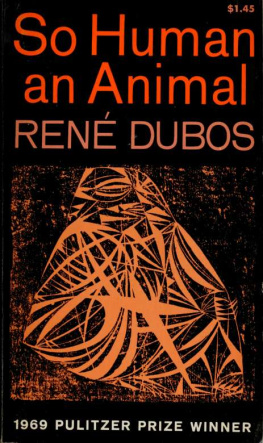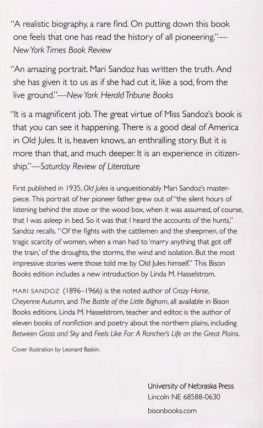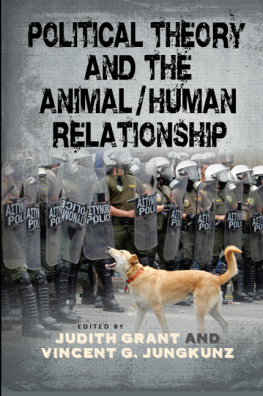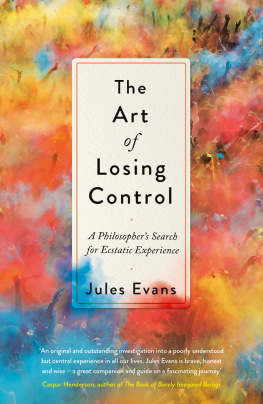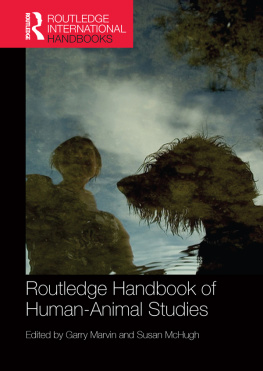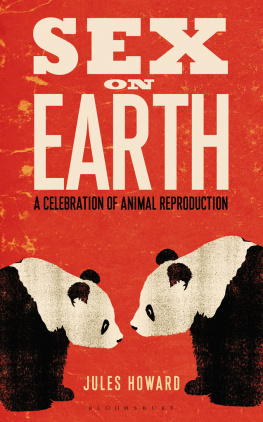René Jules Dubos - So Human an Animal
Here you can read online René Jules Dubos - So Human an Animal full text of the book (entire story) in english for free. Download pdf and epub, get meaning, cover and reviews about this ebook. year: 1969, genre: Science. Description of the work, (preface) as well as reviews are available. Best literature library LitArk.com created for fans of good reading and offers a wide selection of genres:
Romance novel
Science fiction
Adventure
Detective
Science
History
Home and family
Prose
Art
Politics
Computer
Non-fiction
Religion
Business
Children
Humor
Choose a favorite category and find really read worthwhile books. Enjoy immersion in the world of imagination, feel the emotions of the characters or learn something new for yourself, make an fascinating discovery.
- Book:So Human an Animal
- Author:
- Genre:
- Year:1969
- Rating:5 / 5
- Favourites:Add to favourites
- Your mark:
- 100
- 1
- 2
- 3
- 4
- 5
So Human an Animal: summary, description and annotation
We offer to read an annotation, description, summary or preface (depends on what the author of the book "So Human an Animal" wrote himself). If you haven't found the necessary information about the book — write in the comments, we will try to find it.
So Human an Animal — read online for free the complete book (whole text) full work
Below is the text of the book, divided by pages. System saving the place of the last page read, allows you to conveniently read the book "So Human an Animal" online for free, without having to search again every time where you left off. Put a bookmark, and you can go to the page where you finished reading at any time.
Font size:
Interval:
Bookmark:

This book made available by the Internet Archive.



To the skies of the lie de Fiance and oi the Hudson River Valley
*
FOREWORD
Each human being is unique, unprecedented, unrepeatable. The species Homo sapiens can be described in the lifeless words of physics and chemistry, but not the man of flesh and bone. We recognize him as a unique person by his voice, his facial expressions, and the way he walksand even more by his creative responses to surroundings and events.
I shall discuss in the present book how each one of us has become what he is and behaves as he does, always having in mind the course of events that transformed me from a poor boy well adjusted to life in a French village into a reasonably successful citizen of New York City. A few words about my own life may explain the kind of interest I take in the personal history of my fellow men.
When I emigrated to America from my native France at the age of twenty-four, I had no plan for the future except to try my luck in the land of unlimited opportunities, but I must have been in some way preadapted to American life. The immigration officer in New York let me in with a vigorous handshake and friendly words that seemed to imply that I was the ideal type of immigrant. His warm welcome did not surprise me, because a professor from the University of Wisconsin whom I had met acciden
vu
Foreword
tally in Europe a few months before had encouraged me to emigrate with the remark, "I know how to pick a winner."
From the beginning, I have felt completely at ease wherever I have worked in the United States. I doubt that I could have been as healthy, successful, and happy anywhere else in the world. Yet, after more than forty years of continued residence, the most personal part of it in the Hudson River Valley, I still have some mental reservations when I say that I am an American. This is not for lack of allegiance to my adoptive country, or regret at having become an American citizen thirty years ago, but because I have not outgrown and do not want to discard the attitudes that I acquired in the small French villages where I spent my formative years and in Paris during my student days. The subtle quality of the skies, woods, and fields of the He de France country, and the intellectual discipline of French culture, have left an indelible stamp on my biological and mental being.
A few years after arriving in the United States, I drove from New York to the Pacific Northwest during the summer vacation. Crossing the continent over dusty corduroy roads in a second-hand car with old tires was a strenuous enterprise in the late 1920s. The most interesting experiences of the trip, however, proved to be the human contacts in the humble tourist homes and restaurants where I became acquainted with people and ways of life different from those I had known in Europe and on the East Coast.
Since I am six feet tall and have blue-green
VJJI
Foreword
eyes, and at the time of this trip, had Viking-like flaxen hair, I looked as Nordic as the people of Anglo-Saxon and Scandinavian origin who then made up the largest percentage of the population in the Midwestern and Northwestern states. Yet it was obvious that the French culture had made me different from the tall blond young men of my age who had been born and raised in the United States. Traveling from coast to coast taught me also that, irrespective of national origin, racial type, or complexion, Westerners differed from Easterners in behavior and in tastes. Even more striking was the contrast between the American Anglo-Saxons in Seattle and the Canadian Anglo-Saxons in Vancouver.
This auto safari across the continent sharpened my awareness of the influence that geographical and social factors exert on the biological and mental being. Now that I have been around the world, I know that, contrary to what is said, even international airports have their local flavor. The ticket agents, bartenders, waitresses, salesgirls at the souvenir shops behave differently in New York from the way they do in Los Angeles or London, San Juan or Sydney. Jets and world-wide television have not altered the fact that rocky hills and alluvial plains, family farmsteads and housing developments, foster different kinds of people.
During the past forty years my professional activities as a microbiologist have given me many chances to observe in the laboratory that the characteristics of all living things are deeply affected by the conditions of their lives.
Foiewoid
For example, I have studied how the environment in the soil or in the mammalian body influences the multiplication and properties of microbes and how through a series of feedback processes microbial life in turn affects soil fertility and animal development. More recently, I have concerned myself with the effects that nutrition, sanitation, and housing conditions exert on the growth, resistance, life span, and behavioral characteristics of laboratory animals. The experience thus gained in the laboratory has given me the faith that scientific research, properly focused, could usefully complement the traditional humanistic approach to the study of human life.
The structure of the present book has emerged from my personal interest in man's responses to his physical and social surroundings and from my professional knowledge of the forces that can be observed in the laboratory to affect all the manifestations of life. I have used both kinds of information to illustrate that each individual is unique in the ways his innate endowment responds to his environment.
The unifying theme of this book is that all experiences leave a stamp on both physical and mental characteristics. I have placed special emphasis on the very early influences, prenatal as well as postnatal, because their effects are so profound and lasting that they have large consequences for human life. From juvenile delinquency to racial conflicts, from artistic sensibilities to national genius, few are the individual and social characteristics that are not profoundly and lastingly affected by early influences.
Foreword
Since human beings are as much the product of their total environment as of their genetic endowment, it is theoretically possible to improve the lot of man on earth by manipulating the environmental factors that shape his nature and condition his destiny. In the modern world, urbanization and technology are certainly among the most important of these factors and for this reason it is deplorable that so little is done to study their effects on human life.
We claim to live in a scientific era, but the truth is that, as presently managed, the scientific enterprise is too lopsided to allow science to be of much use in the conduct of human affairs. We have accumulated an immense body of knowledge about matter, and powerful techniques to control and exploit the external world. However, we are grossly ignorant of the effects likely to result from these manipulations; we behave often as if we were the last generation to inhabit the earth.
We have acquired much information about the body machine and some skill in controlling its responses and correcting its defects. In contrast, we know almost nothing of the processes through which every man converts his innate potentialities into his individuality. Yet without this knowledge, social and technological innovations are not likely to serve worthwhile human ends.
Font size:
Interval:
Bookmark:
Similar books «So Human an Animal»
Look at similar books to So Human an Animal. We have selected literature similar in name and meaning in the hope of providing readers with more options to find new, interesting, not yet read works.
Discussion, reviews of the book So Human an Animal and just readers' own opinions. Leave your comments, write what you think about the work, its meaning or the main characters. Specify what exactly you liked and what you didn't like, and why you think so.

